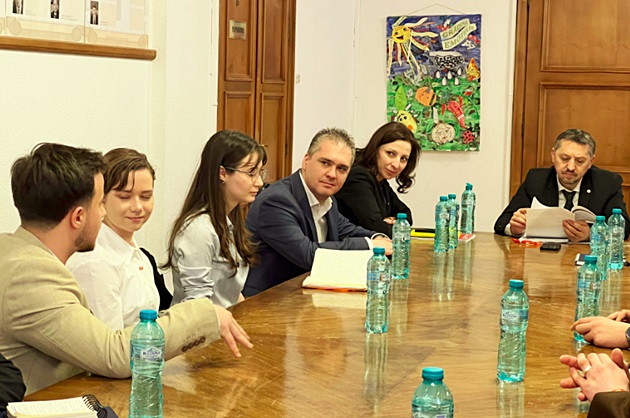732

Rural Students in Romania Face Major Barriers to Education, Says World Vision Report
Children living in rural Romania face significant challenges that affect their access to education, according to a recent statement.
In response, the Children’s Advisory Council of World Vision Romania has launched the “Children’s Program for Their Well-being”, a comprehensive document outlining the key issues and offering concrete solutions aimed at improving the national education system—particularly for children from underprivileged communities.
The youth members of the Council presented their proposals during a meeting with Minister of Education and Research, Daniel David.
Key Issues Identified by Children
Based on research conducted by World Vision Romania, rural students are affected by the following challenges:
- For 22% of students enrolled in the National Healthy Meal Program, this meal is their only one of the day.
- 4 out of 10 middle and high school students do not know if their school has a school counselor.
- 20% of high school students feel that their vote does not matter, and 8 out of 10 young people were exposed to election-related content on TikTok during and after the election campaign period.
- Over 40% of students report not being consulted by teachers about how classes are taught or how they are assessed.
Children’s Proposed Solutions
The “Children’s Program for Their Well-being” includes clear and feasible solutions, grouped into key focus areas:
1. Civic Education and Critical Thinking
Children highlight the importance of developing critical thinking skills. They propose:
- Debate clubs, discussion groups, and critical analysis workshops
- Revised civic education curricula to improve understanding of state functions, political elections, and ideologies
- Teacher training in digital education and critical thinking
- Access to experts who can help students navigate digital spaces safely
2. Interdisciplinary Learning
Children advocate for a more integrated approach to education, including:
- Better coordination of content across related subjects
- Increased collaboration and communication among teachers
- Interdisciplinary contests and projects with practical applications
“In physics class, we’re expected to use fundamental geometry theorems that we haven’t even learned in math class yet,” the document notes.
3. Active Student Participation
Students want a stronger voice in decisions about their education, including curriculum choices and the development of new national frameworks. They call for:
- Clear equity measures between urban and rural areas
- Real guidance and support for students choosing elective subjects
“Many students struggle with choosing electives because, until 8th grade, it’s the parents who decide. This needs to be supported with real guidance so students can make informed choices,” the children explain.
They also stress:
- Investing in teacher training, especially in vulnerable areas
- Avoiding an increase in school hours and focusing on flexible, student-centered education
4. School Infrastructure Improvements
Despite recent upgrades, many children still attend unsafe or outdated schools. They request:
- Modernization of rural schools
- Solutions for issues like lack of science labs, wood-burning stoves, and no wheelchair ramps
A healthy and safe learning environment is essential for quality education.
5. Accessibility and Rural Support
School transportation remains a critical issue. High costs and inadequate systems are barriers that increase dropout risks. Children propose:
- Revising transportation reimbursement systems to reflect actual student needs
- Equipping schools with buses for safe and efficient transport
They also suggest:
- Expanding the national school meal program, prioritizing vulnerable schools
- Nutrition education for students and parents
- Programs to reduce food waste
6. Counseling and Career Guidance
Bullying and lack of psychological support are pressing issues. Students recommend:
- Regular group counseling sessions with school counselors
- Increased visibility and awareness of counselors’ roles among students and parents
- Campaigns on abuse, neglect, violence, and human trafficking, including how to report them
- Development of an accessible online platform for reporting school abuse
Many students also lack career guidance. The Council calls for:
- Individual and group counseling focused on career orientation
“Informed students with a clear future plan are the foundation of a sustainable society,” the report states.
“What Happens After High School?”
Mario Hânceanu, representative of the Children’s Advisory Council of World Vision Romania, stressed the importance of career guidance:
“Many students start worrying about ‘what comes after high school?’ as early as elementary school. The lack of clear information about career paths makes it hard to choose. Students who are well-informed and have a clear vision for their future are the key to a sustainable society.”
Meeting with the Minister of Education
To address these challenges, members of the Children’s Advisory Council met with Minister Daniel David. The Minister acknowledged all their proposals, emphasized that change must begin in rural schools, and highlighted the importance of tailoring policies to children's real needs.
The meeting was productive, focusing on the youth-led program, and both the students and the Minister reaffirmed their commitment to collaboration.
“We need a coherent, sustained approach to ensure a fair, high-quality education system for all children, no matter where they live. I aim to fully understand how the system works through direct dialogue, so that in May, I can present a diagnosis and propose reforms for the benefit of everyone involved,” the Minister declared.
World Vision Romania and the Children’s Advisory Council will continue to promote these solutions through dialogue with authorities and active participation in policy-making, aiming to turn these proposals into reality for Romania’s rural children—offering them access to quality education and a better future.




